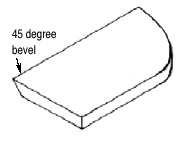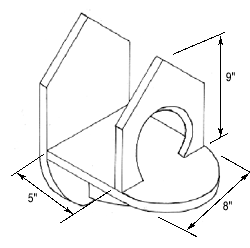

This is the second type of bird table offered by Amateur Woodworker (the first one was in the previous issue). The advantage of this particular model is that you can easily put table scraps onto it, rather than the relatively expensive bird seed needed for the other design. And let's face it, the birds are happy to get anything in the winter...especially if you're a good cook!
Tools required: jigsaw, sander
Wood required (Pine):
| Description | Qty | Thickness | Width | Length |
| Back wall | 1 | 3/4" | 8" | 14" |
| Front Wall | 1 | 3/4" | 8" | 9" |
| Base | 1 | 3/4" | 8" | 11" |
| Base support | 1 | 3/4" | 4" | 9" |
| Roof | 2 | 3/4" | 7" | 8" |
| Feeder stick (dowel) | 1 | 3/8" | 3/8" | 3" |

First, cut the back wall piece to shape, as shown in the diagram (left). Note that the curve on the lower part of this piece does not need to be particularly accurate and can be reshaped to suit your preferences. Once you have done this, you can then cut out the front wall shape. The front wall has the same shape as the upper part of the back wall, with the same (45 degree) roof pitch. Once the outside shape of the front wall has been cut, sketch out the shape of the hole. Leave about 1" at either side of the hole, so that the front of the roof is given adequate support. I went for a rather simplistic design for this entrance way, but obviously the hole can be any shape you wish -- perhaps a more decorative entrance will entice a better class of bird!?! Once the entrance way has been cut (and sanded), drill a small 3/8" hole in the center of the front wall, about 1" to 2" down from the roof's apex. Glue the small piece of dowel into this hole so that the dowel sticks out. This is used to hang small pieces of fat out for the birds -- a real delicacy!
Now cut out the curved shape of the base piece. This curve should begin somewhere between 6" and 7" from the back wall end of the bird table (so that the curve has a radius of about 4") and a smooth curve usually looks best. Once this is done, cut to shape the base support piece. This can be any curve you wish, as long as there is a right-angled support that will attach between the lower part of the back wall piece and the underside of the base unit. Once this last piece has been cut to shape, it is time to begin the actual construction.
Glue and screw the base unit into the back wall piece at a distance of 9" from the top of the back wall (so between 9" and 9 3/4"). Then glue and screw the base support piece into both the base and the back wall, thus strengthening the construction. You can now glue and screw the front wall onto the base, at a distance of 5" (so between 5" and 5 3/4") from the back wall.

Cut the roof pieces out, as shown in the diagram (right). Note that the long straight edge that forms the apex of the roof must be cut at an angle of 45 degrees so that the two roof pieces will sit flush against one another. Once both pieces have been cut to a matching shape, and you are satisfied that they sit well on the roof, glue and screw them into both the front and back walls.
All that remains is to sand the bird table thoroughly and then stain the wood to a suitable color. To attach it to a tree, drive a long screw through the middle of the back wall into the tree trunk.
